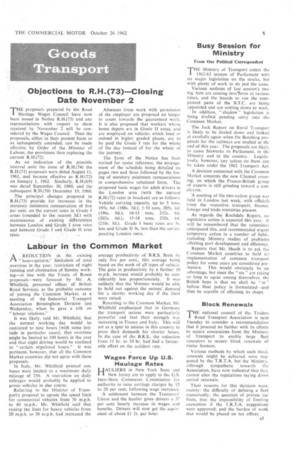Labour in the C ommon Market
Page 7

If you've noticed an error in this article please click here to report it so we can fix it.
AREDUCTION in the existing "hours-pattern," limitation of total overtime in the year, restriction of night running and elimination of Sunday working—in line with the Treaty. of Rome proposals—were forecast by Mr. A. Whitfield, personnel officer of British Road Services, as the probable outcome of joining the Common Market, at a meeting of the Industrial Transport Association Birmingham Division last Wednesday, when he gave a talk on "labour. relations."
It was likely, said Mr. Whitfield, that the normal working day would • be restricted to nine hours (with some latitude in particular cases), that overtime might be limited to 100 hours in the year and that night driving would be confined to "certain stipulated hours." It was pertinent, however, that all the Common Market countries did not agree with these proposals. In Italy, Mr. Whitfield pointed out, buses were limited to a maximum daily mileage of 250. A restriction on daily mileages would probably be applied to goods vehicles in due course. Referring to the Minister of Transport's proposal to uprate the speed limit for commercial vehicles from 30 m.p.h. to 40 m.p.h., Mr. Whitfield said that raising the limit for heavy vehicles from 20 m.p.h. to 30 m.p.h. had increased the average productivity of B.R.S. fleets by only five per cent., this average being based on the work of all types of vehicle. The gain in productivity by a further 10 m.p.h. increase would probably be considerably less proportionately. It was unlikely that the Minister would be able to hold out against the unions' demand for a shorter working day if the limit were raised.
Reverting to the Common Market, Mr. Whitfield emphasized that in Germany the transport unions were particularly powerful and that their strength was increasing in France and Italy. This will act as a spur to unions in this country to press their demands for shorter hours. In the case of the B.R.S., the reduction from 11 hr. to 10 hr. had had a favourable effect on the ace'ident rate.




































































































